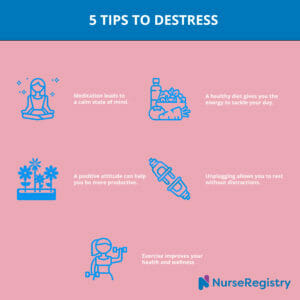Stress is a natural part of human life. Everyone experiences it at one time or another. Stress is the human body’s way of managing problems. It is also known as the fight-or-flight response. When danger is near, this response is triggered. The body and mind begin working extra hard to handle any issue or problem that is around the individual.
Stress may help individuals in times of need with work, competitive games, and other challenges. Yet it may also cause a variety of health issues if an individual is overly stressed. These issues include problems with your health, relationships, mood, productivity, and quality of life, just to name a few. Other common problems related to stress are depression, weight problems, and even heart disease.
Signs/Symptoms
IN THIS ARTICLE
Stress may not be noticed right away and can even be normalized by individuals—especially for those working in the healthcare industry. Some people experience it so much, it becomes a part of their everyday life. Some common signs to look out for are memory problems, anger or moodiness, chest pain, rapid heart rate, and over- or under-eating.
Causes of Stress
Certain events or tasks may be highly stressful. Not all stress comes from negative relationships or issues. Positive events such as purchasing an expensive item, college, and interviewing or receiving a promotion are very stressful for some individuals. Some external causes are issues with relationships, work, and finances. A few internal causes are a negative attitude and expectations that are out of reach. Your stress level may also be aggravated by your diet.

Stress Prevention
- Meditation. This is used as a form of relaxation, where an individual focuses their mind on one particular thought or object in order to achieve a calm state of mind. To start off, try some of these breathing techniques or yoga for beginners.
- Exercise. Exercise is important to build an individual’s physical fitness, health and wellness. It has also been proven that exercise lowers blood pressure and releases endorphins, which reduces the perception of pain and generates positive feelings throughout the body.
- Positive attitude. Individuals with this kind of attitude are full of laughter and kindness. This is known to make people happier, better problem solvers,and harder workers.
- Healthy diet. A diet that is full of fruits, vegetables, and high-quality protein will help an individual cope with everything that life will throw at them, compared to a diet filled with processed, refined, and sugary foods.
- Unplug. The world we live in is filled with all sorts of electronics such as computers and cell phones. It is important to get a good night’s rest. To do this an individual can unplug their devices before going to sleep so that they can rest without any distractions. A person can also unplug for a period of time throughout the day to destress.
To find out more information about stress and ways to destress go to Helpguide.org, Harvard Medical School, and Medicinenet.com.
Written by Jesse Rio





